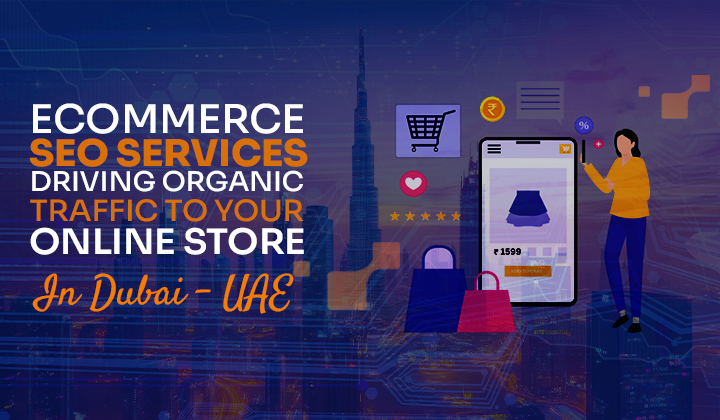Driving Organic Traffic with Expert Ecommerce SEO Services
Ecommerce SEO Services: Driving Organic Traffic to Your Online Store
Most ecommerce SEO content tends to recycle foundational tips like optimizing titles, improving page speed and building backlinks. These are necessary, but not sufficient considering that ecommerce business organizations that desire to thrive in the competitive online world.
Successful ecommerce SEO today requires a nuanced, integrated approach that combines technical innovation, strategic marketing and scalable software solutions. This will ensure that your online store will not only be ranked highly but will be promoted as well. On an onward course of growth by continually improving with the evolving search engines and demands of the users.
Whether you are a small business owner looking to automate SEO growth with limited resources. A software developer tasked with building robust and SEO-friendly ecommerce systems. A marketing manager focused on demonstrating clear SEO ROI and aligning SEO with paid and offline campaigns. This guide dives deep into advanced ecommerce SEO strategies. These are not tips or tricks, but practical, real-life suggestions. That will transform the organic presence in your store and increase the rate of conversion of your store.
Ecommerce Advanced Technical SEO problems
Ecommerce websites are complicated in nature. Their size, dynamic inventory and filtering by users make them unique with respect to technical SEO challenges that cannot be overlooked.
API-Driven Ecommerce Architectures and SEO
The emergence of headless commerce and API-first platforms presents a lot of flexibility and
Complexity in SEO.
- Indexability of content: Lots of current eclipse frontends make use of JavaScript to retrieve product data by way of APIs. Non-dynamically rendered content might however not be indexed by the search engine crawlers. It is important to implement server-side rendering (SSR) or dynamic rendering in order to ensure that bots are able to view and index your product and category pages.
- URL Consistency and Canonicalization: API usually generates dynamic URLs with different parameters in filters and sorting. This will lead to duplication of content without the right canonical tags. Make sure that API endpoints are used and that the URLs are clean and canonical and that they cannot produce infinite forms of the URL that would hurt SEO.
- Sitemap Automation: The inventory is extremely dynamic. Auto-generation and updates of XML sitemaps through API integrations will get search engines updated and precise data on your product catalog, enhancing crawler efficiency and index freshness.
SEO Audit and Fixes Automation via Integrations
Auditing of a large ecommerce site manually is time-consuming and is likely to be delayed.
- Automation minimizes these bottlenecks
- Monitoring APIs to monitor critical SEO issues like broken links, multiple meta tags or schema and so on, using a control SEO monitoring tool (e.g., Screaming Frog, Ahrefs, SEMrush).
- It is important to inform the developers or the SEO managers of the problematic situations in real time with the assistance of webhook alerts. To be able to fix them in a short time before the ranking is compromised by the issue.
- Automate basic fixes using CMS or e-commerce platform extensions that integrate with your APIs. Auto-populating any missing or alternate descriptions or auto-adding alt text to new images.
This would provide constant checkups and automatic repairs, which work towards living through the SEO without a lot of human effort.
Faceted Navigation and Infinite Scroll
Infinite scrolling and product filters are amazing in terms of user experience and come with SEO traps:
The Faceted Navigation: It allows sorting by color, size, price, or brand to result in an unlimited number of URLs that have a high level of similarity and result in the issue of duplicate content. To manage this:
- Backpoint filter URLs with canonical tags where feasible to the main category pages.
- Filter pages of low value Exclude low-value filtered pages by using robots.txt files or noindex meta tags.
- Add parameter management in Google Search console in order to provide instructions to Google on how the URL parameters are to be treated.
Infinite Scroll: Infinite scroll works well with end users, but is problematic with crawlers whose JavaScript performance is poor.
- Use paginated URL and infinite scroll with correct rel="prev" and rel="next".
- Alternatively, the lazy loading should be made SEO-friendly and loaded progressively without disrupting crawling.
- Proper management of these would ensure index bloat is avoided and your site would remain SEO-driven to useful pages.
Semantic Search and AI in Ecommerce SEO
Contemporary search engines rely on advanced natural language processing and artificial intelligence to comprehend the intent of a user way beyond matching keywords. Ecommerce sites that capitalize on semantic search and AI are outstanding in the organic search positions.
Organizing Product Data in Semantic Entities
Schema markup is foundational for ecommerce SEO, but going beyond basics can unlock new opportunities:
- Add markup product variations, product bundles and upsells to include detailed product context.
- Promote and advertise deals with Offer schema and make your deals stand out in the search.
- Apply Review schema with sentiment analysis to present not only to the star ratings but also to customer sentiment.
- Add shipping options, availability status and delivery times to structured data to achieve the right expectations.
This rich structured data allows Google to produce rich snippets to make your listings rich with price, stocking and review stars, which increase the amount of people clicking your listings greatly.
Dynamical Content Personalization by AI
Artificial intelligence technologies have enabled ecommerce websites to customise onsite content in real-time, according to visitor behaviour or according to perceived search intent:
- Machine learning applications are able to offer personalized product recommendations that can be presented depending on the browsing history and tastes of the user.
- Dynamically modified on-page copy can be used to highlight product features that align with the intent of a visitor, e.g. durability as a focus to buyers who are interested in longevity.
- Voice and long-tail search query FAQs can be auto-generated by AI to respond to the typical semantic questions directly.
Personalization does not only enhance the rates of conversion, but indirectly, it enhances the SEO indicators such as dwell time and lowers the bounces rates.
Going Beyond Basic Schema
More advanced schema applications are:
- Action schema allowing the user to transact or query directly out of search results, e.g., Buy Now or book a demo.
- Breadcrumb schema which displays intricate, changing category structures which enhances search engine optimization as well as user navigation.
- Video and image metadata schemas that enhance multimedia SEO that will allow your product videos and images to rank in special search features.
These enhanced applications of schema markup are able to distinguish your listings and enhance visibility in the search capabilities of varying features.
Search Engine Optimization Automation for Small Businesses
Constant manual SEO management is not always a realistic option to those small business owners who have to balance numerous tasks. The automation strategies will allow you to keep up with competitive SEO at minimal costs of time and finances.
Tactics of Automation in practice
- Install SEO extensions or web based optimization solutions that automatically optimize meta titles, descriptions, alt tags and internal links according to pre-determined rules.
- Conduct periodic automated site audits with tools such as Screaming Frog or Ahrefs API integration scanners which identify issues with search engine optimization and provide actionable advice.
- Automated performance reporting tools can inform the stakeholders with concise performance updates of SEO without human.
Monitoring and Continuous Improvement
- Make such clear KPIs as increase in organic traffic, decrease in bounce rate and conversion rates to achieve the success of SEO.
- Automatic notification of unexpected ratings or technical failures should be installed, in order to take some fast actions.
- Automate balancing with regular manual inspections to identify subtle content and UX problems that cannot be detected by tools.
This will be most efficient and will not interfere with the human judgment that is essential in making decisions on delicate aspects of SEO.
Lens of developer: Constructing SEO-Compliant Ecommerce Systems
Developers hold the keys to unlocking scalable, robust ecommerce SEO through system design and integration best practices.
Developing Scalable SEO Friendly Product APIs
- Create APIs that can provide SEO relevant information including unique product descriptions, meta titles and structured data effectively.
- Filtering, sorting and pagination support query parameters with clean canonical URLs.
- Offer search-engine friendly dynamic sitemap generators with up-to-date inventory information.
Pitfalls and Solutions of Headless Commerce SEO
- Do not render using client-side rendering only and exclude server-side rendering (SSR), which reduces the crawlability.
- Prerendering or hydration Use structures and develop tools to feed SEO-sensitive content to bots.
- Use URL structures diligently to ensure the index does not become bloated with duplicate or near duplicate pages that are produced by faceted navigation.
The Risk Management of Continuous Deployment and SEO
- Add SEO audits to CI/CD pipelines to identify regressions such as missing or broken links.
- Automate schema validation and meta tag audits during build processes to ensure a quality of data.
- SEO change Use feature flags to roll out the change, provide controlled rollout and be able to roll back in case of problems.
This makes SEO scalable and stable as your ecommerce platform grows.
Marketing Manager Strategies: SEO ROI and Enterprise Alignment Measurements
SEO will enable marketing managers to make informed decisions and justify budgets and work towards larger business objectives.
Combining SEO Data and CRM and Paid Campaigns
- Link CRM data with connect SEO analytics to monitor customer lifetime value created as a result of organic search.
- Consistently paid search and organic search campaigns to eliminate keyword cannibalism and to reach the maximum number of people.
- Ideally, use the multi-touch attribution models to quantify the effectiveness of SEO along the customer path.
SEO-Based Revenue Forecasting and Budgeting
- projected organic traffic increase according to positioning of keywords and search volumes.
- Calculate estimations and mean order values to predict revenue that is attributable to SEO.
- Show actual ROI analytics against paid channels to prove worth of investing in SEO.
Working across teams to be successful in SEO
- Arrange frequent liaisons between the marketing, development and product teams so that the SEO priorities are cognized and implemented.
- Publish SEO dashboards and reports to create focus and transparency.
- Plan the release of content to the audience and technical releases and marketing campaigns in sync with each other to ensure the greatest effect.
Case Study: The solution of inlinkers that connects SEO and software growth to the ecommerce growth
Inlinkers, a Dubai-based software house specializing in ecommerce SEO, exemplifies how combining technical development with marketing expertise drives growth:
- Product feeds Automated feeds ensure that sitemaps and schema information are always up to date and efficient to the crawler.
- Constant observation of API informs teams of issues that may affect the SEO such as broken links or missing metadata before it influences rankings.
- Personalization of dynamic content that is segmented according to the visitors enhances engagement and conversions.
- With analytics dashboards, the performance of the SEO can be directly related to the sales or customer behavior metrics, making it possible to make strategic investments.
Such a comprehensive strategy exhibits the exceptional importance of combining software knowledge with the SEO strategy.
Future-Proofing Ecommerce SEO: Emerging Trends to Watch
- Voice and Visual Search Optimization: A conversation-based search and image-based search adapts content to increase reach.
- AI-Generated Product Descriptions: To prevent fines and attract user interest, it is essential to balance between efficiency and quality and uniqueness.
- Privacy-First Tracking: SEO analytics needs to adjust itself to changing privacy laws and diminishing cookies and be able to deliver useful information.
Summary: Build Your Ecommerce Store to the Next Level with SEO Services
Ecommerce SEO today demands more than ticking boxes. It involves a synergistic system of combining software writing, marketing plan and automation. With an openness to progressive technical SEO, semantic content organization and data-driven marketing, your online store will be able to acquire quality traffic, minimize friction in the operation and do whatever it takes to increase the revenue.
Whether you're a business owner eager to automate growth, a developer building scalable SEO-ready systems, or a marketing manager focused on ROI, partnering with an expert like Inlinkers can help you unlock the full potential of ecommerce SEO.
Frequently Asked Questions
What is the effect of headless commerce on SEO and what possibilities can I solve to reduce risks?
Headless commerce is a decoupling of frontend and backend that may create issues in SEO such as the inability to crawl content that has been rendered on the client. Use server-side rendering (SSR) or dynamic rendering and provide your API with crawlable data with correct URLs and metadata.
What role does automation play in ecommerce SEO?
Continuous monitoring, audit and correction of SEO problems like broken links, duplicate content or missing metadata are also assisted by automation which saves time and minimizes human error particularly in large and dynamic stores.
How can AI improve ecommerce SEO?
AI can be used to personalize, dynamically customize onsite content, automatically generate FAQs, or analyze semantic search intent to produce more relevant content that can be used to improve rankings and user interaction.
How do I measure the ROI of ecommerce SEO?
Combine the data of SEO with your CRM to monitor the conversions of organic traffic and the customer lifetime value. Measuring the impact of SEO on the funnel multi-touch attribution and predicting revenue improvements among traffic and conversion dimensions.
Why is structured data important for ecommerce SEO?
Formatted information assists search engines in getting to know your products hence rich snippets such as prices, reviews and availability as few search results will boost your click through rates and customer trust.
Was this article helpful?
Yes, it was fine! No, or there was something offComments - 02
Leave a Reply
About InLinkers
An Emerging Tech Company In Dubai-UAE Delivering Innovative Software Solutions For your Business Growth
Categories
Tags
Newsletter
Contact us
Get instant solutions for your business, drop us a message for instant help
Send


